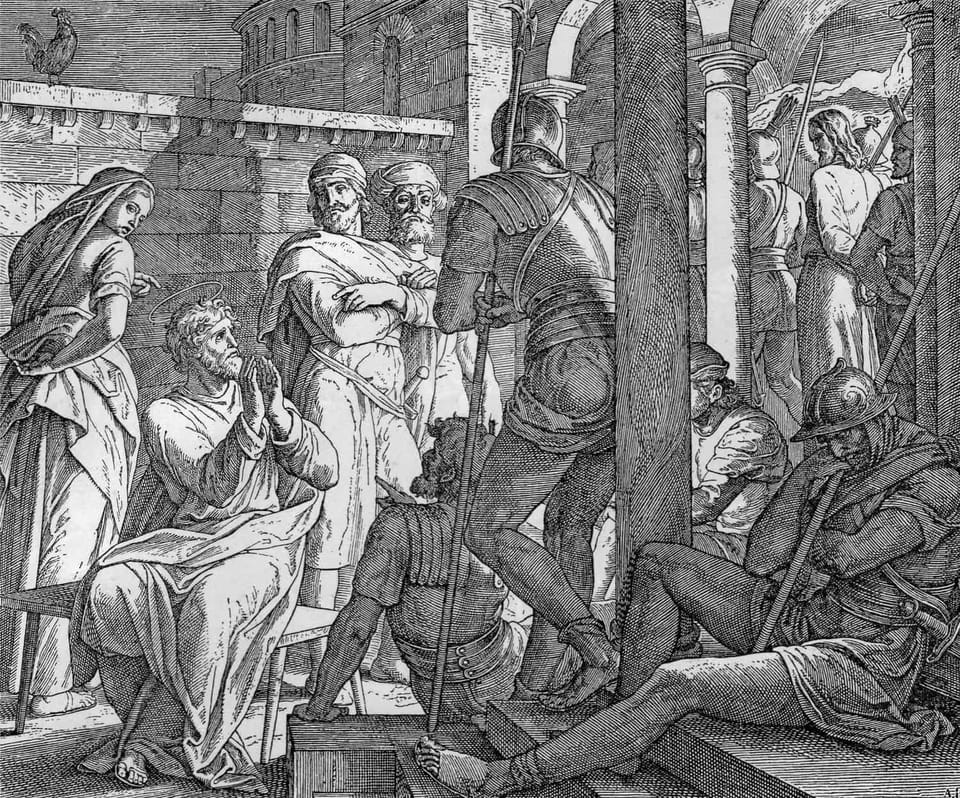Hope for Messes (Luke 22:31-42, 54-62)

Big Idea: You’re a mess — but Jesus responds to messes by praying, seeing, forgiving, and restoring.
One of the biggest ideas that we struggle with is that God could ever love us. The great theologian Karl Barth, a great and controversial theologian, was once asked how he would summarize the essence of the millions of words he had published, he replied, “Jesus loves me this I know, for the Bible tells me so.” At one level we understand that. But then we wonder: could it ever be possible that God could love us?
We read passages like this:
Sing aloud, O daughter of Zion;
shout, O Israel!
Rejoice and exult with all your heart,
O daughter of Jerusalem!…
The LORD your God is in your midst,
a mighty one who will save;
he will rejoice over you with gladness;
he will quiet you by his love;
he will exult over you with loud singing.
(Zephaniah 3:14, 17)
We wonder: could it be true? With all that we’ve done, and with the mess we’ve made in our lives, could God really love someone like me?
I’ve talked to people who know, at an intellectual level, that God loves them. But they’ve struggled deep down to know and rest in God’s love. I’ve even heard one or two of them say that they would love, for just one minute, to feel the extent of God’s love for them. It’s one of the deepest hungers and longings that we have. But we think that our messes get in the way.
If you’re questioning if God could ever rejoice over you, quiet you by his love, and exult over you with loud singing because you’re such a mess, then today’s for you. You need this passage, and I do too.
You’re a Mess
We have good reason to doubt God’s love for us. We’re a mess.
I don’t know if you ever watched Scooby-Doo as a kid. I did. Every show was basically the same.
Shaggy, Fred, Daphne, Velma, and their dog, Scooby-Doo were called, were always getting themselves into trouble. In every episode, they faced a villain: a ghost, a witch, or some other ghoul. In each episode, the villain is caught. And here’s what would happen:
In every single episode, the villain turned out to be a person you’d never expect. We’d always assume the villain would be that really mean tour guide, or the obsessive park ranger, or the mean gasoline attendant from the beginning of the episode. But as the Gang ripped off the mask of the villain, it was always quite the surprise. The villain was always the really nice janitor, the sweet teacher, or the seemingly “good guy.”
One author observes:
Grover and Scooby-Doo teach us precisely what Christianity has been trying to teach us about Good Friday: the villain and the monster aren’t who we thought they were. In the Gospel stories, everyone fails; everyone sins against Christ—even the best disciples, even the “good guys.” In the end, the villain is us. (A.J. Swoboda, A Glorious Dark)
That’s exactly right. We expect that the villain is going to be the bad guy out there: the drug addict, the gang member, the hardened criminal. But it’s never that simple. We’re the villains. We have the problem.
In the passage before us, Jesus turns to Peter and says, “Simon, Simon, behold, Satan demanded to have you, that he might sift you like wheat, but I have prayed for you that your faith may not fail” (Luke 22:31-32). I didn’t notice this until this week, but the you in this passage is plural. Jesus is saying, “Satan has demanded to have each of you.” Jesus is talking to the good guys. They’ve been close friends with Jesus for three years now. Jesus has poured his life into them. He’s taught them, commissioned them, lived with them, and loved them. They’ve seen him do miracles. And now Jesus looks at them and says that Satan’s coming after them. The only reason that he centers Peter out is that he knows that Peter will have a special role in restoring them.
Not only that, but Jesus says that Satan is going to sift them. If you’re like me, you’re not really familiar with what sifting wheat is like. The farmer, you want to separate the inedible part of the grain — chaff — from the edible grain. The way to do this is to spread the wheat on the floor and beat it. Then you throw it in the air. The inedible parts are lighter, and would be blown away by the wind. The edible parts would drop to the floor and be collected by the farmer.
That doesn’t sound like much fun, does it? But that’s what Jesus says that Satan wants to do with him. He wants to beat us, to scatter us so that we’re blown away like chaff. The old preacher Charles Spurgeon said:
So, dear friends, rest assured that Satan hates every good man, and that, some time or other, he is pretty sure to show that hatred in a very cruel and deadly attack upon him.
Make no mistake: Satan will do everything he can to sift you. You’d think that our reaction would be to prepare for attack and to resist at all costs, wouldn’t you?
Peter’s pretty sure that he will be able to resist, even if it costs him his life. Jesus knows better. Jesus has no illusions about our strength. At the end of the chapter we end up with Peter denying Jesus three times, just as Jesus has predicted. Every one of the disciples abandoned Jesus. It’s not the bad guys who abandoned Jesus; it’s the good guys too.
Notice, by the way, how embarrassing Scripture is to the disciples. Once in a while I hear the theory that the followers of Jesus fabricated stories about Jesus. If you were going to fabricate a story, wouldn’t you fabricate one that made you sound better than this? This story is real. One of the evidences that it’s real is that it’s so humiliating for the good guys. They don’t come out looking so good. They come out looking human. This story has the smell of truth to it.
Here’s what I want to tell you today: you’re a mess. I’m a mess too. Let’s not pull any punches. We have good reason to doubt that God could ever love us, because we’re a bundle of contradictions, doubts, and blatant sin. To top it off, we have an enemy who’s coming after us in full force. He wants to blow us away. How could God love messes like us?
Some of you came in today thinking that God could never love someone like you. You’re far too messed up. If you feel like that, it sounds like you have a pretty good grasp of reality. You are, in fact, a mess. You’ve got a good handle on the first part of this sermon. I just really want you to hear the second part.
But some of you came in feeling pretty good about yourself. You think you’re doing okay. Here’s what you need to hear today: you’re an idiot too. The best among us are. I like how Ortlund put it in the video we just watched: “The simple fact is that there isn’t one nanosecond when God looks at me and says, ‘Ooh, that’s impressive.’”
You, right here, right now, are a mess. Let’s drop the masks. Every week we come for a counterintuitive reason: to be reminded again that we’re simply not that impressive. There’s not a lot about us that separates us from the Peter and the disciples. We’re idiots. Welcome to the club.
What does Jesus do with people like us?
There’s Hope for Messes
We wonder how God could ever love people like us. This passage gives us every reason to be hopeful. Why?
Jesus prays for us.
In verse 32, Jesus says, “I have prayed for you that your faith may not fail.” Now that is really cool. Instead of writing us off because he knows what we’re like, Jesus instead chooses to pray for us. If there’s anyone I want praying for me, it’s Jesus.
Jesus doesn’t just stand back and wait to see if we can pass the test. Jesus prays for us. “I am sure that if the Holy Trinity were not busy day and night strengthening my faith, it would evaporate in a minute” (John Piper). We are never alone.
Jesus sees us.
There’s an interesting detail in verse 61. As soon as Peter had denied Jesus three times, Jesus looked at Peter. It was at this moment that Peter realized that what Jesus predicted had come true.
What kind of look did Jesus give Peter? Was it a withering look? Was it an “I told you so” look? Or was it a truthful but encouraging look, a look that held out hope for Peter’s future?
It was certainly a convicting look. You see that by the way Peter reacted. But it’s also an encouraging look. Nothing had taken Jesus by surprise. As I studied the passage this week I was reminded that this look maintained the connection between Jesus and Peter. Nobody put it better than Spurgeon:
It is not possible for any one of us to give such a look as that…There were volumes of meaning in that look. “Is that Peter, who declared that he would never deny me? Remember, Peter, what I said, and what you answered; and see which of us turns out to be right.” That look also said to Peter, “All these griefs, and all this shame that I am enduring, do not pierce me so keenly to the heart as your denial does.” Yet was it not also a look of inexpressible tenderness, as if the Master said by it, “I love you still, Peter; so come back to me, and I will yet restore you”? I think it was a heart-piercing look and a heart-healing look all in one, —a look which revealed to Peter the blackness of his sin, and also the tenderness of his Master’s heart towards him.
Our greatest struggle when we sin is to believe that Jesus could look at us at our worst and still love us. Jesus’ look at Peter reminds us that he can. Jesus looks at the sinner tenderly. He in no way minimizes our sin, but neither does he allow it to be the last word in our relationship with him.
Jesus looks at you today. He sees the best and the worst in us. And he loves us.
Jesus forgives us.
Don’t forget the reason that all these events were taking place. Jesus wasn’t a victim of circumstances beyond his control. He went to the cross for a reason. He went to the cross for Peter’s sins. He went to the cross for ours.
In verse 37 Jesus said: “For I tell you that this Scripture must be fulfilled in me: ‘And he was numbered with the transgressors.’ For what is written about me has its fulfillment.”
What amazing verse. Jesus quotes from a prophecy made about him hundreds of years earlier by Isaiah (53:12). Isaiah had said that someone would come who would identify with the rebels and the wicked. Jesus says this is now happening to him. What does it mean that Jesus is numbered among the transgressors? It means that he saves us. He was willing to die a shameful death so that we could be forgiven. Jesus forgives us.
Jesus restores us.
Even before Peter failed, Jesus told Peter that he’d play a role for him in the future. His failure wouldn’t be the end of the story. Jesus says in verse 32, “And when you have turned again, strengthen your brothers.”
I don’t know if there’s a more encouraging thought than this one. Can God use failures? They’re all he uses!
Later on, Jesus would appear to Peter on the shores of the Sea of Galilee and tell him, “Feed my lambs.” Jesus restored Peter to ministry, and Peter went on to play a key role in the start of the church in Jerusalem.
I imagine that Peter’s failure helped prepare Peter for ministry. I know many people who have let God down and thought that there is no way that God could ever use them. God restores messes. He uses them again. God uses the flawed, the broken, and the failures to do his work.
Martin Luther said, “When Satan tells me I am a sinner he comforts me immeasurably, since Christ died for sinners.” You’re a mess — but Jesus responds to messes by praying, seeing, forgiving, and restoring.
In his book Doubting, author Alister McGrath shared the following story to illustrate how we can know God loves us:
An aunt of mine died some time ago, having lived to be 80 or so. She had never married. During the course of clearing out her possessions, we came across a battered old photograph of a young man. My aunt had, it turned out, fallen hopelessly in love as a young girl. It had ended tragically. She never loved anyone else and kept a photograph of the man she had loved for the remainder of her life.
Why? Partly to remind herself that she had once been loved by someone. As she had grown old, she knew that she would have difficulty believing that, at one point in her life, she really had meant something to someone—that someone had once cared for her and regarded her as his everything. It could all have seemed a dream, an illusion, something she had invented in her old age to console her in her declining years—except that the photograph gave the lie to that.
It reminded her that it had not been invented; she really loved someone once and was loved in return. The photograph was her sole link to a world in which she had been valued.
The communion bread and wine are like that photograph. They reassure us that something that seems too good to be true—something that we might even be suspected of having invented—really did happen.
We gather together every week to remind ourselves of a couple of things. One: that we’re idiots. God isn’t impressed with us at all. The best of us are sinners. Two: that we are deeply loved. Jesus prays for his own; he sees them; he forgives them; he restores them.





